Courses Paid courses Vision Impairment FE
Vision Impairment FE
| Achieve a certificate |

The term vision impairment is used to describe a loss of sight where the person ranges from severely sight impaired (blind) to sight impaired (partially sighted). Around 4,600 students aged 16 to 18 (RNIB, 2021) in colleges of further education have a vision impairment. A young person is thought to have a vision impairment if they have an eye condition that cannot be fully corrected using glasses or contact lenses.
Vision impairment is a lifelong disability that requires proactive specialist provision and support if the learner is to develop fundamental skills, make equivalent learning achievements and lead emotionally resilient and independent lives. Where a learner does not have access to the same visual experiences and cues as their peers, their learning opportunities can be significantly impaired.
This course responds to the information needs of the whole community centred around supporting the young person with a hearing impairment. You will learn how to assess the needs of a learner and go on to develop a support plan consisting of SMART goals and interventions, which you will implement and later review to determine how well it has met the learner’s developmental needs.
Our Vision Impairment course is perfect for those who work with students in a further education setting such as teachers, college tutors, teaching assistants, heads of department and college leaders. This course is also useful for the parents/carers of students with a vision impairment.
Course learning outcomes
On successful completion of the course, you will be able to:
- describe the impact that vision loss can have on student learning and social inclusion
- use checklists to carry out observations of a student’s functional vision
- make appropriate adjustments in the classroom environment to support the learning and social inclusion of vision impaired students
- employ strategies to increase independent learning skills
- prepare students for transition to work or university
- create a support plan for a pupil/group of pupils in your school
Our courses are structured into four sections. Click on the section headings to reveal page titles and some example content.
Understand what visual impairment is and the importance of inclusion in a further education setting.
- Section objectives
- What is vision impairment?
-
How the eye works
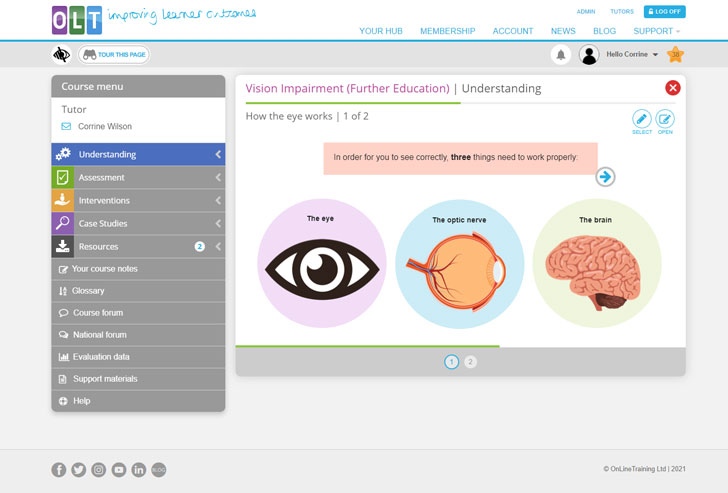
Screenshot from Understanding page 3 - Common eye conditions
- Albinism
- Aniridia
- Astigmatism
- Cataracts
- Optic atrophy
- Glaucoma
- Hypermetropia (long sight)
- Maculopathy
-
Myopia (short sighted)
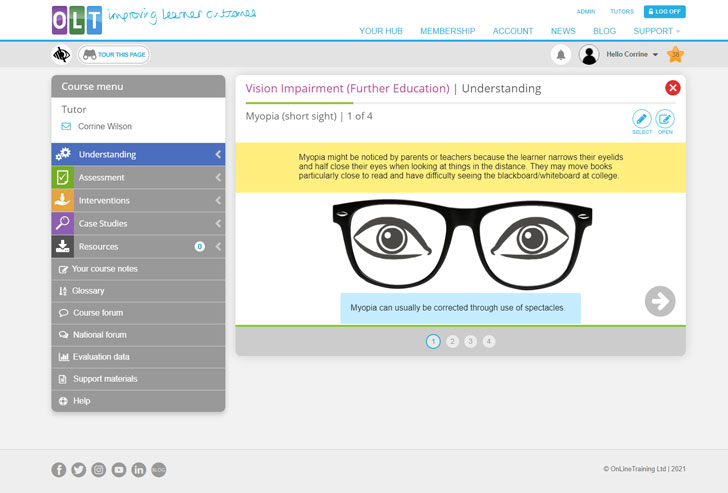
Screenshot from Understanding page 13 - Nystagmus
- Retinitis pigmentosa
- Facts and figures
- Quick quiz: Fact or fiction – common eye myths
- A history of the education of those with visual impairment
- The history of visual impairment – 20th century
- How does vision impairment affect a child’s development?
- End of section quiz
- Section summary
Explore some of the formal and informal tests used to assess vision and its implications for learning.
- Section objectives and your learner profile
-
Why assess?
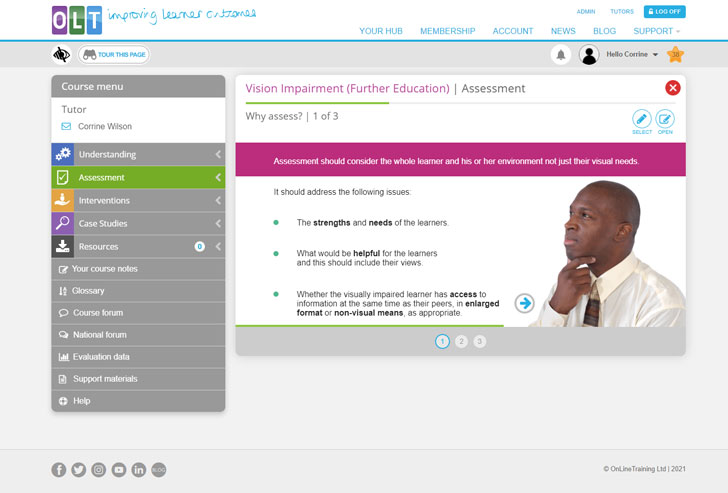
Screenshot from Assessment page 2 - Visual assessment
- What does visual acuity mean?
- Functional vision and its effects on learning
- Can’t read print/see pictures
-
Strategies to improve access
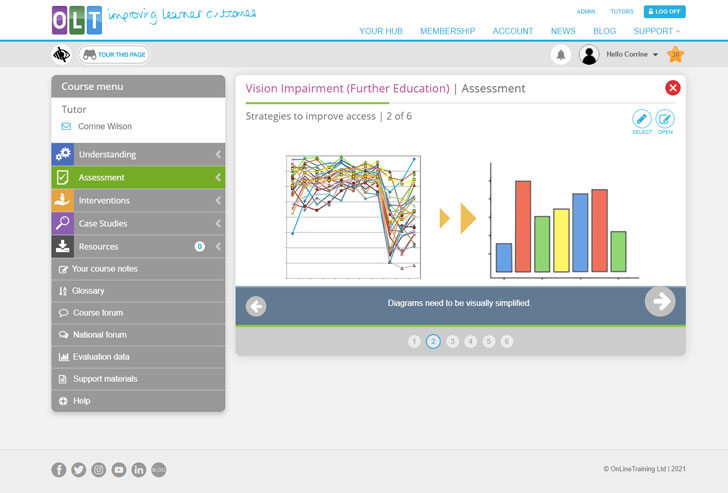
Screenshot from Assessment page 7 - Assessing individual needs
- Social interaction and communication
- Learning needs
- Mobility needs
- Assessing the environment
- Planning for independence
- Course assignment: Your learner’s three SMART goals
- Section summary
Choose from a range of strategies to develop personalised learning programmes to ensure equality of access for learners with vision impairment.
- Section objectives
- Considerations to ensure curriculum delivery
- Advance planning
- Modification of materials and provision of additional resources
- Adapting the classroom environment
-
Use of technology and other resources
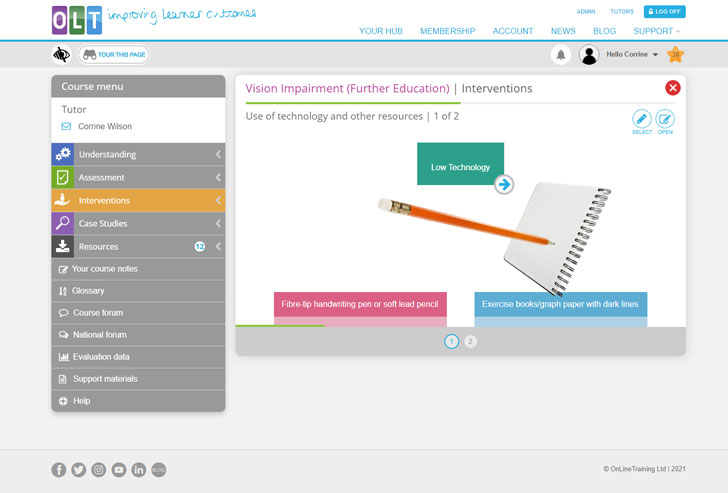
Screenshot from Interventions page 6 - Self-help and independence skills
- Social skills
- Specific interventions
-
Educational provision
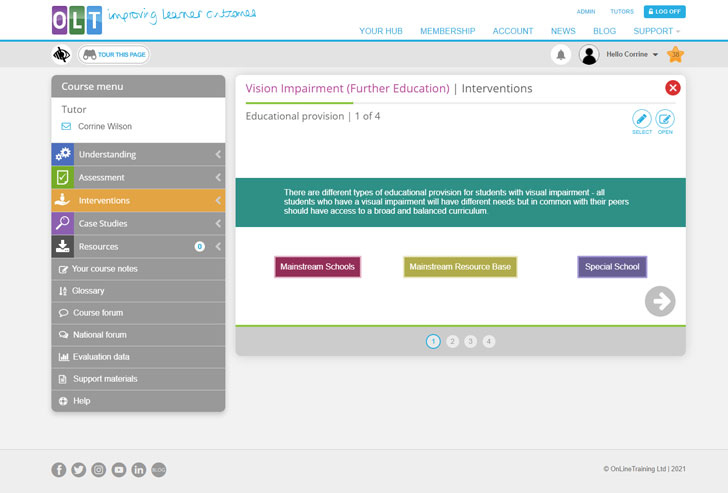
Screenshot from Interventions page 10 - Course assignment: Your learner’s interventions
- End of section quiz
- Section summary
View real life examples of interventions and their resulting progress.
- Case study: Nancy prepares for A levels
- Case study: Introduction: Sussex Downs College
- Case study: Sussex Downs College – Rohan
- Case study: Lewes college – David
- Case study: Sussex Downs College supporting mature students
- Case study: Transitions to college, university or work
It has given me confidence and much more knowledge about VI, that I can take and put into practice. The case studies were great for giving more understanding.
Other Position (24/06/2021)
The training has given me a deeper understanding of the difficulties that students with VI face. I have been able to support my student by enlarging worksheets and using visual clues and timetables, which have contributed to raising his self-esteem and feeling of achievement.
Teaching Assistant (21/06/2021)
Very informative and really makes you think about how much a visual impairment affects learning
Teaching Assistant (11/05/2021)
Understanding how visual impairments impact development and learning will help me support students more effectively.
Teaching Assistant (19/03/2021)
This course has allowed me to set goals which I have run alongside my appraisal and will help me better support my student this year.
Teaching Assistant (10/03/2021)
On starting this course, I had little knowledge of visual impairments and although we do have students with a VI, I have not been directly involved with their support. I now feel I have a much better understanding of the complexities and range of conditions that affect a person's sight as well as how young people have overcome barriers to go on and achieve. I will be researching two particular eye conditions which relate to students at our college. I will also be reading their EHCPs and support needs. Both of these actions will improve the support I could give should I be required to work with those students. I will look at how we adapt lessons to make them more inclusive for students with a visual impairment and be mindful of the social interaction difficulties that are particular to a VI student. Lastly, the importance of promoting independence and seeing how this can best be achieved or improved has been highlighted by completing this course.
Teaching Assistant (03/03/2021)
The training introduced me to a variety of visual impairments that I was not aware of. It also explained the different impact each condition might have on an individual, stating how it might differ between each person. I was able to identify new methods for assessment to determine what my students needs were and confidently write SMART goals and interventions to successfully implement these measures. My tutor was only an email away and was very responsive and supportive of my development. Thank you
Teaching Assistant (10/02/2021)
As a DSA specialist mentor, it will give me the confidence to ensure that the VI specialist assessor's needs assessment is implemented to the full at the university. Also, that I can discuss any emerging needs of the student and we can work out a plan to meet them.
Other Position (05/01/2021)
I feel more confident in understanding SI. I can understand when a student describes their condition. I am more confident in being aware of the aids available for a VI student. When I started the course I had a good understanding of students with dyslexia and autism but knew nothing about VI. I particularly enjoyed the section on common eye conditions. My mother suffered a detached retina and I did not understand what that meant at the time but now I do. My son suffers from Astigmatism and short sightedness, and I had little understanding of these conditions. I really enjoyed the course as it was detailed and very interesting. I benefited from seeing all the examples of students at university and how well they were coping.
Qualified Teacher (14/12/2020)
As my role is very similar to mentoring the impact has mainly been on how I would approach working with a VI student. E.g. greatly increased confidence in talking to VI students about their needs; increased awareness of the impact that VI can have on learning and development as a whole. This has also meant a more joined up approach to VI students that is inclusive and takes into account the implications of a social model of disability and the wider adjustments that should be made to allow VI students equal access.
Advisory Teacher (30/11/2020)
| Rating |
| |
Delivery
|
| |
20 hours, 1-2 hrs per week |
| |
Flexible start date |
| |
Assignment
|
Licences
Your school or education system can purchase a licence to deliver our courses.
Contact us to find out moreCertification
20 hrs CPD Certified What's this?
Certificate of Achievement

